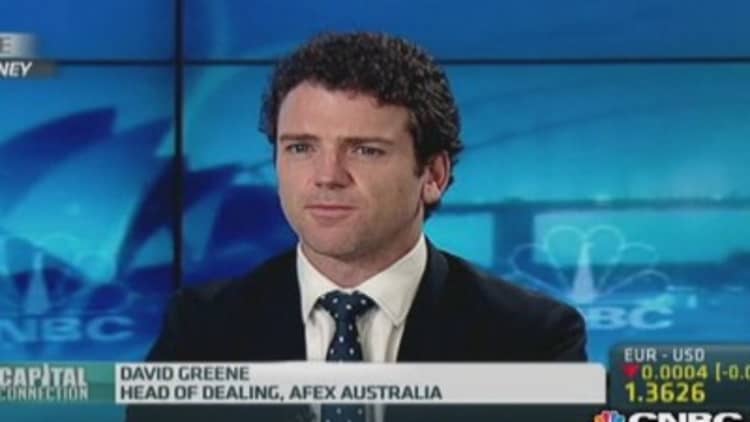Australia's economy appears to be slowing and some economists argue that a more subdued outlook could lead to further monetary easing from the country's central bank.
Australia is due to report first quarter economic growth on Wednesday. While economists polled by Reuters expect robust growth of 3.2 percent on-year, up from 2.8 percent in the previous quarter, and 0.9 percent on-quarter, a marginal increase on 0.8 percent last quarter, analysts say the economy will take a turn for the worse in the second quarter.
"I think the second quarter is where we'll see a huge disturbance as there's been a huge change or shift back in [Australia] that will certainly affect that number," said Evan Lucas, market strategist at IG.
Read MoreWhy Australia's AAA rating is not really at risk
"All of a sudden come April things weren't as rosy coming out of China, people were talking about the budget which was perceived as being quite tough - and as taking 0.3 percent of GDP (gross domestic product) out of the economy according to most economists. All of that stuff is going to filter through," he said.
Lucas expects second quarter growth to slow to 0.4 percent on-quarter from 0.7-0.8 percent in the first quarter and sees this pull back prompting the Reserve Bank of Australia (RBA) to take a more dovish stance.
"The effects of the budget, the slowdown they've finally seen in housing prices, the real under-performance in commodity prices and the consequential effect on the mining space may finally see their neutral status going back to slightly dovish," he added.
Read MoreRead MoreAustralia grapples with soaring obesity
Other economists shared this view. Analysts at Goldman Sachs also expect a more dovish tone from the RBA ahead of Tuesday's policy meeting due to a number of factors.
"Commodity prices have fallen sharply, global growth faltered somewhat in early 2014, inflation printed relatively benignly and business and consumer surveys moved lower. In response the RBA incrementally has sounded more dovish," Goldman analysts said in a note. They expect the RBA to cut interest rates by 25 basis points in September.

Australia's economy enjoyed 20 years of strong growth thanks to its mining boom, but lost some of its luster recently as the boom showed signs of peaking and growth in China – its largest trading partner - slowed.
Furthermore, Australia's conservative government delivered the country's harshest budget in 20 years last month; many economists are concerned about the toll it will take on the economy.
Business and investor confidence dropped following the budget, while red-hot housing prices eased – a factor that economists worry could dampen consumer spending.
Read MoreAustralia's budget:Harsh or fair?
"I think Q1 GDP numbers are going to be pretty strong on Wednesday, but after that we could be in for some subdued numbers," said Ray Attrill, co-head of currency strategy at National Australia Bank.
"If it is the case that this seeming stalling in house prices is permanent that's going to have a more durable impact on subduing consumer spending. So the risk is that we're going to see a much more subdued consumer in the months ahead," said Attrill.
Goldman analysts also expect robust first quarter GDP in Australia but see slower growth momentum in the second quarter.
"Financial conditions have tightened and an audible snapping in consumer sentiment post the Budget has taken sentiment to levels not seen since prior to the current rate easing cycle," they said.
The RBA left interest rates at a record low of 2.5 percent on Tuesday, for the ninth straight month.


